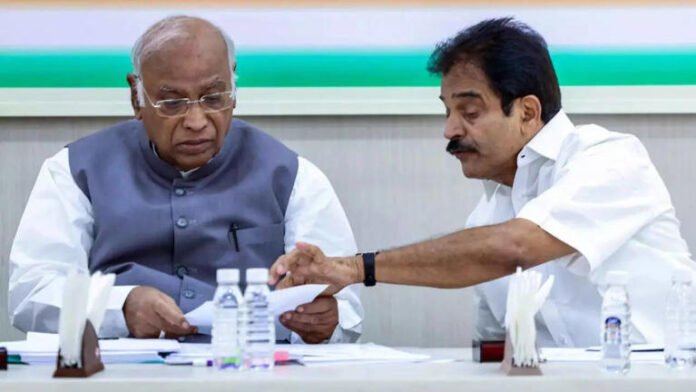The Indian National Congress (INC) has unveiled its second list of candidates for the upcoming Maharashtra Assembly elections, naming 23 additional candidates across several key constituencies. The Congress Party’s move comes amid intense political maneuvering and alliance considerations, with Maharashtra set to become a major battleground in the upcoming polls. This new list reflects Congress’s strategic focus on regional issues and attempts to balance internal party dynamics while positioning itself against the ruling BJP-Shiv Sena coalition.
Strategic Choices in Key Constituencies
In releasing this second list, Congress aims to strengthen its presence in pivotal districts across Maharashtra, a state marked by complex political landscapes and distinct regional challenges. Among the constituencies included in the list are several urban areas with significant populations that have previously leaned toward rival parties. By fielding well-known local figures in these regions, the Congress Party seeks to connect with voters who may feel alienated by the ruling coalition’s policies.
The candidates on the second list include experienced leaders, grassroots activists, and younger candidates, representing Congress’s commitment to appeal to a broad base. For instance, candidates with a strong record in rural and agricultural issues have been fielded in areas with high farmer populations, a demographic that Congress has targeted through promises of loan waivers and agricultural reforms.
A Mix of Experience and Fresh Faces
Congress’s candidate selection reflects a careful balance between experienced politicians and new faces who bring fresh perspectives and energy to the campaign. Established leaders, some of whom have held ministerial roles in the past, have been chosen for constituencies where the party has a strong base. These experienced politicians are expected to leverage their political acumen and existing networks to secure seats.
The inclusion of younger, lesser-known candidates indicates Congress’s attempt to engage the youth vote and showcase its commitment to promoting new leadership within the party. Candidates from the Youth Congress and other feeder organizations have been fielded in constituencies with high youth populations, a demographic that both Congress and the BJP have actively courted.
Focus on Farmers and Rural Issues
Maharashtra’s rural regions, home to millions of farmers, are critical in any electoral calculation. Congress has been vocal about the challenges faced by farmers, including rising debt, inadequate support prices, and drought-related hardships. The second list reflects Congress’s focus on these rural issues, with candidates in areas like Marathwada and Vidarbha, regions deeply affected by farmer distress.
The Congress manifesto has emphasized loan waivers, increased support prices, and water management initiatives. Party strategists believe that these commitments, combined with candidates well-versed in agricultural challenges, will resonate with the rural electorate. Congress hopes that by prioritizing farmer-friendly candidates and policies, it can chip away at the BJP’s rural voter base, which has shown signs of discontent with the incumbent government’s handling of agricultural issues.
Caste and Community Considerations
As is common in Indian politics, caste and community considerations have played a role in Congress’s candidate selection. Maharashtra’s electorate is diverse, with strong representation from Dalits, Marathas, OBCs, Muslims, and other communities. To maximize its appeal, Congress has fielded candidates who belong to and have strong support within these communities.
The selection includes Dalit leaders in constituencies with significant Scheduled Caste populations, as well as OBC and Maratha leaders in regions where these groups are influential. By fielding candidates who reflect the demographics of each constituency, Congress aims to tap into community loyalties, which play a crucial role in Maharashtra’s electoral dynamics. This approach also signals Congress’s commitment to social justice, a key aspect of its campaign messaging.
Women Candidates and Representation
The Congress Party has also emphasized gender diversity in its selection process. Women candidates have been given representation in this list, albeit a limited number, as Congress seeks to attract female voters by demonstrating its commitment to gender inclusivity. Maharashtra’s female electorate has shown an increasing political awareness in recent years, and Congress is keen to tap into this demographic by prioritizing issues like healthcare, women’s safety, and economic empowerment.
Coalition Challenges and the Road Ahead
One of the challenges Congress faces is managing its alliance with the Nationalist Congress Party (NCP). As coalition partners, the Congress and NCP have had to engage in extensive discussions to avoid overlapping candidacies in key constituencies, ensuring that they do not dilute each other’s support. The release of this second list indicates that the two parties have made significant headway in their negotiations, although some constituencies may still witness friendly contests due to local dynamics.
The ruling BJP-Shiv Sena coalition poses another significant hurdle for Congress. With the incumbent coalition using state-level policies, development narratives, and nationalistic themes as key campaign points, Congress faces an uphill battle. However, with a well-rounded list of candidates and targeted regional campaigns, Congress aims to capture voters frustrated with the incumbent government’s handling of issues like inflation, unemployment, and farmer welfare.
As the Maharashtra Assembly polls draw closer, the Congress Party’s release of its second list of 23 candidates reveals its approach to capturing a diverse voter base through a mix of experience, youth, and demographic representation. With candidates strategically placed in constituencies where they can address local concerns, Congress hopes to present a formidable challenge to the ruling BJP-Shiv Sena coalition. Whether this approach will translate into electoral success remains to be seen, but the party is determined to leverage its regional focus and candidate diversity to make a strong comeback in Maharashtra.

